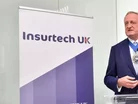Peppercorn is the first UK Insurtech to get EIS relief

Peppercorn, the newly launched UK car insurtech, will be the first company in the space to receive Enterprise Investment Scheme (EIS) relief.
The startup, which provides a digital, personalised, and automated car insurance service to its customers, combines underwriting rules, technology, cutting-edge data, AI and a re-imagined CX to deliver a self-service lower cost product to the marketplace.
Peppercorn originally applied for the EIS tax relief in July 2020, but was rejected under the previous guidelines. The company reapplied in April and has just been approved for relief.
Speaking about the change in regulation, and what it will mean to UK insurtech startups, Peppercorn CEO, Nigel Lombard explained, “As well as the process taking a large amount of effort and time, the absence of advance assurance meant the traditional early stage routes of sourcing investment from angels and EIS funds was effectively blocked,” he said. “The good news is it won’t be anymore for new MGA startups.”
Lombard said he was pleased the insurtech now qualified for the EIS support following it’s rejected application last year.
“We applied to HMRC for SEIS and EIS advance assurance in July 2020 with support from [accountancy] PKF Littlejohn. We understood the rules for qualifying businesses – that insurers do not qualify - and were clear we qualified in line with HMRC’s definitions.”
Lombard said Peppercorn answered several rounds of questions from HMRC to confirm it would not be a risk carrier, the underwriter nor a legal entity effectively owned by an insurer. Rather, it would be an MGA with delegated authority which would be regulated by the FCA.
He continued; “In October 2020, HMRC advised they couldn’t provide advance assurance because insurance activities were excluded from the list of qualifying trades.
New tax relief for UK insurtechs
Insurtech UK, which is the biggest insurtech alliance globally with a membership base of more than 100 insurtechs and partners, worked collaboratively with HMRC for over a year to update the EIS and SEIS guidance.
Peppercorn was used as a “case in point” to rework the regulations in favour of insurtech companies.
The updated HMRC public guidance now states that MGA’s, which include insurtechs, now qualify for SEIS and EIS relief.
Commenting on the recent change, Insurtech UK’s chair of government and external affairs working group, John Warburton, said, “Resolving the SEIS/EIS issue was one of the primary campaigning objectives of Insurtech UK when we formed in 2018.”
He said the move was a critical requirement for the sector to organise itself and speak with a collective voice in order to achieve a positive outcome. “We are delighted, therefore, that our work has resulted in a change in guidance from the government, but more importantly, a real life case study where an insurtech has immediately benefited from it,”
He continued, “We are pleased to secure our first major lobbying win as an association and we will continue to campaign on behalf of our members to ensure that the UK becomes the global leader for insurance innovation.”
EIS case studies
Warburton said there were several case studies of insurtech MGAs who had been rejected from SEIS/EIS eligibility because of an incorrect assumption by HMRC that because it was working within the insurance sector, it was an insurer that carried on insurance activity.
“Insurance is an excluded activity from SEIS/EIS as per the legislation, but this only relates to insurers who bear financial risk on behalf of customers – something that an MGA does not do as an intermediary.
“Insurtech UK worked with our partners, including PKF Littlejohn and Smith and Williamson, to provide written guidance for HMRC inspectors about the nature of the MGA business model and we sought to update the public guidance on the issue to provide clarity that MGAs as a business model are eligible for SEIS/EIS relief.
“The change in the public guidance, the assurance that HMRC inspectors have been notified of the changes and the positive outcome of the Peppercorn application shows that our efforts have been successful.”
Featured Articles
Charles Taylor InsureTech launches 'Bordereaux Sync', an AI-powered tool that screens and repairs data errors before they enter management systems
New insurance facility offers up to €1bn coverage for large-scale data centre projects across UK and Europe as demand for digital infrastructure soars
Mphasis teams with Sixfold to accelerate policy processing and boost premium generation per underwriter




